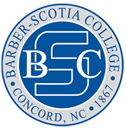 Barber-Scotia College is a historically Black educational institution founded in 1867 by the Presbyterian Church in Concord, North Carolina. In 2004, the college had its accreditation revoked by the Southern Association of Colleges and Schools. The school had accumulated debt and was accused of awarding degrees to students who had not met academic requirements. Without accreditation, Barber-Scotia College lost financial support from the United Negro College Fund and students at the school could no longer receive federal financial aid.
Barber-Scotia College is a historically Black educational institution founded in 1867 by the Presbyterian Church in Concord, North Carolina. In 2004, the college had its accreditation revoked by the Southern Association of Colleges and Schools. The school had accumulated debt and was accused of awarding degrees to students who had not met academic requirements. Without accreditation, Barber-Scotia College lost financial support from the United Negro College Fund and students at the school could no longer receive federal financial aid.
Immediately after the loss of accreditation, enrollments dropped from 600 to fewer than 100. Yet the board of trustees refused to give up. The college tried to refocus on a business administration curriculum with the hope that local businesses would use it as a training institute. But this strategy failed. Then the college refocused its efforts once again, this time toward religious education. The college applied for accreditation with the Transnational Association of Christian Colleges and School. But accreditation was not granted.
The college’s website is still in operation. Under the menu choice “Upcoming Events” the latest entry is for September 30, 2011. The latest issue of the College Catalog and College Handbook is for 2010-12. There are no entries on the college’s calendar for the remainder of 2015.
David Olah, president of the college stepped down earlier this year. He has been replaced by Yvonne A. Tracey who holds the title of interim president. She had served as vice president for student affairs.
The Independent Tribune, a newspaper in Concord, North Carolina, reports that it has an interview scheduled with President Tracey for next month. But the newspaper was told that Tracey would only field questions about her qualifications and vision for the college. A Barber-Scotia College spokesperson would not reveal to the paper how many students, if any, were enrolled at the institution.


Barber Scotia college currently has 35 students enrolled. 20 athletes, basketball and 15 college prep students, it is disgraceful and a shame how this HBCU is operating. These kids have nothing, and on top of nothing receiving a below below substandard education, the buildings on this campus are deteriorating mold , water leaks. Attending a college with no up to date reference materials no classroom structure, struggling to feed the students enrolled. Ashame to say the least. Someone has to step in and help these students I know they have to feel ripped off left behind. The City of Concord should be ashame of themselves, if the health department paid a visit, these buildings will be would be deemed inhabitable and this campus would be shut down. it’ll be over. Bad situation all around for these students.
NEED A COPY OF MY DEGREE.